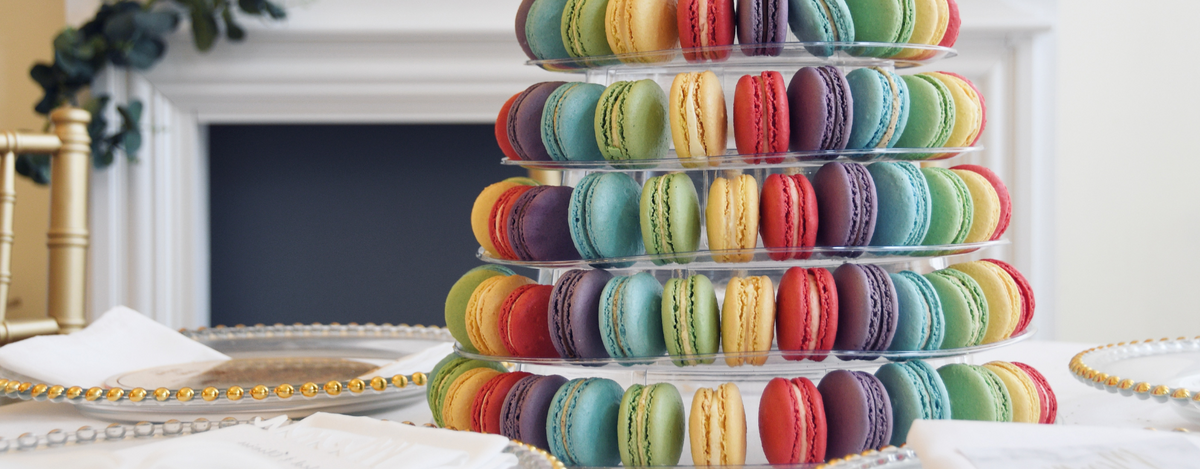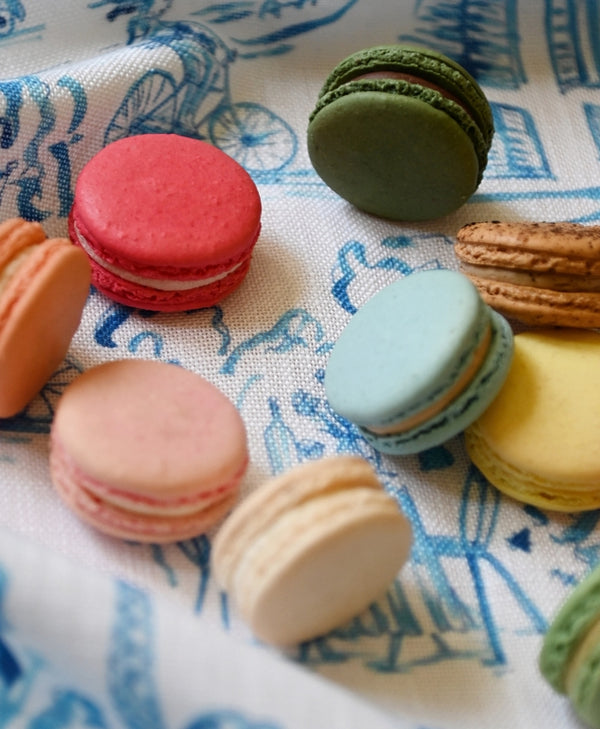


I went to France as au pair and came back a master of macaron
Rachel Hanretty turns sweet hobby into booming business back home.
When you first walk through the front door you immediately notice the array of colourful macarons displayed on the counter and the smell of fresh coffee, as Edith Piaf plays in the background.
Paperbacks by Sartre line the bookshelf next to two plush chaise longs and you can sip your latte while gazing at the Eiffel Tower.
But this isn't a trendy cafe on the left bank in Paris - it’s a little slice of France in the heart of Edinburgh.
Mademoiselle Macaron opened in May and is the brainchild of Rachel Hanretty, 25, who was inspired by a year spent living in the French capital as part of her English degree at the University of St Andrews.
Already a fan of the tasty macaron Rachel humped at the chance to learn how to make the sweet meringue-based confection herself at the Alain Ducasse Cooking School in Paris. She said:
“I used to babysit for a little girl and her mum and dad had very good jobs. For Christmas, the mum was given cookery school vouchers by her work and she told me to have them as she didn’t have the time to use them. So off I went and it was thanks to them that I learned how to make macarons. I think it probably is more authentic to learn how to make them in France. I learned from a very good pastry chef and the class was about going over the ingredients and the technique, whereas with some places it’s quite superficial learning. It was a very professional set-up and there was no nonsense.”
At the time, Rachel was paying 690 euros per month to live in a tiny student that had no oven and offered two electric hotplates as cooking facilities. So it wasn’t until she returned to Scotland that she really tested her newfound baking skills. She said:
“I kind of forgot about the macarons because my kitchen in Paris was so small and I didn’t even have an oven, so I wouldn’t have been able to make them. But I held onto the recipes and when I came back to Scotland I tried to make them and failed miserably. It took a few more attempts to get it right.”
They idea that she could make money from selling the macarons was sparked by an advert asking young entrepreneurs to pitch a business plan in 20 seconds. Rachel entered the competition and won £250 largely, she says, because she put a plate of macarons in front of the judges. Soon, she was selling her product to French restaurants in the city and at two of Edinburgh’s food markets. By the beginning of this year, she knew she had to take her business to the next level. Rachel said:
“It got to the stage where I was making at least 1000 macarons a week in my little flat and it just wasn’t sustainable. I was getting orders for weddings, I was teaching how to make macarons at the Edinburgh School of Food & Wine and I’d employed someones to be at another market. It all looked like it was growing. One day, I walked past this shop and the place next door was for let. I spoke to a woman who was coming out and asked what she knew about the shop for let. She said she was moving to the shop next door and I asked her if she wanted to rent this one. So I did all my sums and it felt like serendipity. I’m just really headstrong and I don’t hang about. I had a very close friend at university and he got very ill. He died of cancer a week before we were supposed to open. It makes you think that you should just go for it. We are doing well - although there’s a long way to go before I’m a millionaire.”
Rachel’s entrepreneurial ventures are all the more impressive considering she has lived with epilepsy for most of her life. But she says the condition has simply made her more determined to succeed and believes her business has had a positive impact on her health. She said:
“When I was 11 I had chronic seizures, which were quite severe, so I went into hospital. I was put on medication but the seizures weren’t going away, they were getting worse. Two weeks before my 15th birthday, they operated and took out a bit of my brain and that made it go away for w while. Everything was grand. I did all my exams, got my driving license, went to Paris. Then, when I came back from Paris I had a massive seizure. I had an appointment with the consultant on February 14th this year and she said they could operate again because they’d found out they hadn’t taken enough away in the first place. Of course, you go out of the appointment thinking ‘Oh my god, someone wants to crack my skull open again’. I wasn’t so keen on that idea. It wasn’t until the last four months that they sorted out my medication, which is great because it coincided with me opening the shop. The thought that I might have to go back into hospital again has actually made me more determined. It has also made me try to build a more sustainable business where, if I need to be removed, it will still run smoothly. It teaches you resilience. It’s weird that since I opened the shop I’ve gone without seizures. It’s like positive stress. You think ‘If I can do this without part of my brain, I’m doing all right.’”
Rachel has big plans for the future, which include opening a bar if she can find the right business partner. And a second Mademoiselle Macaron pâtisserie in her native city of Glasgow is another possible venture she’s considering. Right now, she is focusing on the Edinburgh shop, which is also home to a French dressmaker in residence and where she hosts macaron-making classes twice a month. Rachel said:
“It really is a little bit of Paris in Edinburgh. It’s a chic moment, an indulgence, which is very much how French women view pâtisseries. They are all very skinny but they will still have something sweet, they don’t deny themselves. Pâtisseries in France are about a moment, Here, it’s about grabbing a muffin on the go. They treat pâtisseries in France with such reverence and respect. I just wanted to create a wee moment for people to slow down and enjoy.”
Makings of a macaron: The macaron is a meringue-based confection made with eggs, icing sugar, granulated sugar, almond powder and food colouring. Although it’s origins can be traced back to 1791 at a convent near Cormery in central France, it was not until the 1830s that the macaron was served two-by-two with special fillings. The modern day version, which is filled with buttercream, jam or ganache, was originally called the Gerbet or Paris Macaron. Both Pierre Desfontaines of the French pâtisserie Ladurée and another baker, Claude Gerbet, have been credited with inventing it.

